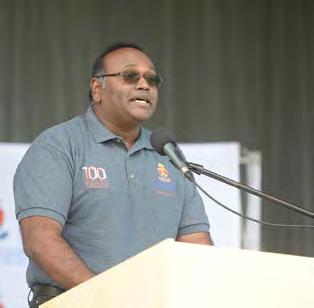
3 minute read
Take-Home Practical Classes and the Use of Video Demonstrations

Step-by-step remote practical demonstration Maize field work

Various departments were very innovative in their solutions to remote practical classes, from physics to biological, agricultural, and consumer and food sciences.
Physics experiments were designed that used equipment that would be easy to find. Experiments included simulations (eg, mirrors and lens applet on the computer) and real experiments (Hooke’s law with a bottle of water suspended from rubber bands and friction involving a book wrapped in paper sliding off a paper-wrapped incline plane). Students also did a projectile motion practical class where free motion analysis software was used to track the path of a projectile. Although most students opted to use the data supplied, some did the experiment themselves. In these experiments, several variations illustrated the details or limits of applicability of the physical law investigated; eg, with Hooke’s law, the deviation from ideal behaviour of the rubber bands was observed, and with friction, the relative independence of friction on a macroscopic contact area was investigated. The feedback received from the students indicated that they enjoyed doing these practicals, realising that one does not need purpose-made equipment to do real physics experiments. They also enjoyed the autonomy they had in designing the experiments.
Three modules presented by the Department
of Plant and Soil Sciences, Introductory Soil Sciences (GKD 250), Principles of Plant Pathology (PLG 262) and Soil Fertility, Soil Microbiology and Plant Nutrition (GKD 420 / GDK 783) introduced ‘take-home’ practicals. Students had the opportunity to fetch prepared practical kits from campus (or the department couriered them to those who did not live in or around Pretoria), and students conducted the practical experiments/projects at home. Students had to take photos of their progress on a weekly basis, upload them on Google Drive, collect data and then write a practical report based on what they had and the results they obtained. In this way, students had to take ownership of their experiments/projects, execute and monitor a research investigation, and gather, manage and interpret data.
In Sustainable Crop Production and Agroclimatology (PPK 251), Professor Michael van der Laan introduced a community engagement initiative as part of the practical component: namely, ‘Grow your own crop and make a “how to” video’. In one of the best projects, the student actually made a profit. Comments received from students about this activity included: ‘The practical project was very fun and eye-opening’ and ‘Having a project to do outside helped my mental health during quarantine’. They also had a number of students growing their own crops on the University’s community engagement site, Moja Gabedi in Hatfield, which worked very well, and substantial knowledge transfer took place.
Traditionally, clothing construction modules presented by the Department of Consumer and Food Sciences relied on small groups of students watching demonstrations and then repeating the steps. Social distancing prevented this mode of demonstration. The solution was to make video recordings of each step for each practical class. This was achieved using a GoPro camera with a chest harness to do the initial recordings. Afterwards, these were edited into short video clips, integrated with the theory slides and sections from the prescribed textbook. The video clips were then played in class. Advantages of this included overall class discipline, saving time and allowing repeat viewing. Importantly, the overall standard of the practical work improved. It took many hours to film these demonstrations, and even more to edit them into video clips, but these are now valuable teaching resources.
The foods practical classes (VDS modules) also had to be adjusted because of a reliance on perishable foods. In terms of consumer sensory research, past practice relied on getting a sample of diners into a restaurant setting and collecting data about their sensory experiences. As the restaurant industry was one of those most adversely affected by COVID-19, lecturers had to rethink data collection and chose to implement a variant of the popular food-delivery idea. Instead of participants sitting in a restaurant setting and sharing their sensory experiences, they had food delivered to their homes, from where they could safely participate in the research. Similarly, in the past, students acquired hospitality management skills by organising an event. Since the EAT@UP restaurant was closed under the COVID-19 regulations, the department was forced to adapt and actually improved their ability to offer students world-class, hands-on training. Students were each assigned the task of planning and managing the production, packaging and delivery of a meal to their customers’ homes.


Innovative food practical assignment










